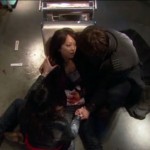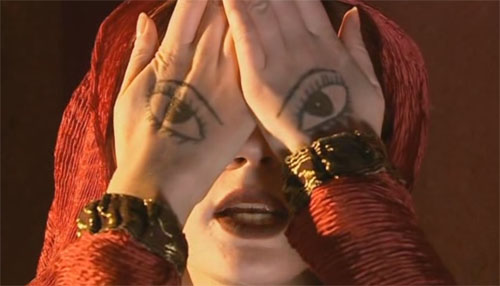
“The Fires of Pompeii” is the second episode of the newest season of Doctor Who–season four, if you number them beginning with the franchise’s rebirth with the Ninth Doctor, or series seventeen thousand and something if you’re more rigid in your Who fandom. For simplicity’s sake, I call it season four. There’s an interesting arc developing for this season, and this episode gives us a little more insight into what it’s like to be a Time Lord. My spoiler-laden review follows.
Aliens in the Volcano
This episode begins with Doctor and his new companion Donna arriving in ancient Pompeii on the day before Vesuvius will erupt. Jumping to points in the future and present are all well and good, but many of my favorite Doctor Who episodes have the Doctor going to some known point in history and having to work with or against historical events to make sure the timestream flows uninterrupted. His encounters with Shakespeare, Dickens, and Victoria were brilliant, and this episode puts him in a similar circumstance, as he is in a city that is about to be covered by molten lava. Only… it isn’t.
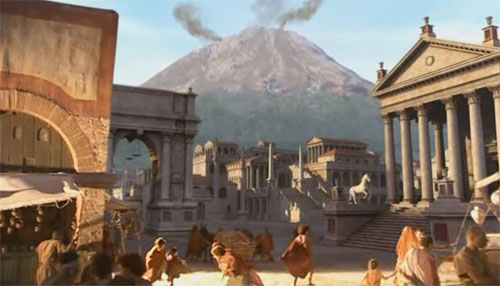
Seventeen years prior to the Doctor’s arrival, an earthquake shook Pompeii. At that time, the “gods of the underworld” became restless and began making noise from the Pompeiians’ heat vents that look down into the volcanic caverns. More significantly, it was at that time that all the supposed seers and soothsayers of the city gained actual precognitive powers. They have been able to accurately predict events, the weather, and the crops, but for some reason none of them have seen the volcanic obliteration of their city.
The Doctor eventually figures out that the seers haven’t seen the eruption because it is not going to happen. Thousands of years ago, a displaced alien race called the Pyrovile fell to Earth. Being entities of rock, they shattered on impact and lay dormant beneath Pompeii until an earthquake awakened them. They then began reconstituting themselves through human hosts as Pompeiian seers inhaled the vapors of Vesuvius, including particles of the Pyrovile’s rocky bodies. The Pyrovile unlocked latent psychic potential in their hosts and began enacting a plan to harness the volcano’s energy to power their ship under the mountain. Rather than allow the volcano to erupt, they are going to use its energy to fund their domination of Earth and founding of a new homeworld.
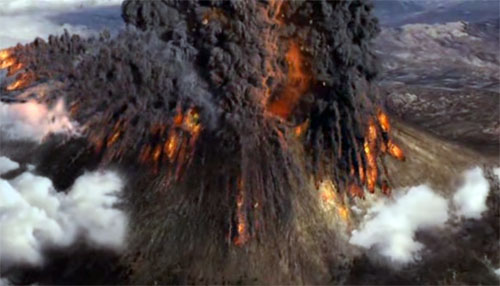
Faced with the annihilation of Earth, the Doctor is forced to sabotage the aliens’ work, thereby actually causing the eruption of Vesuvius and the destruction of Pompeii and the twenty thousand people within it.
A New Prophecy
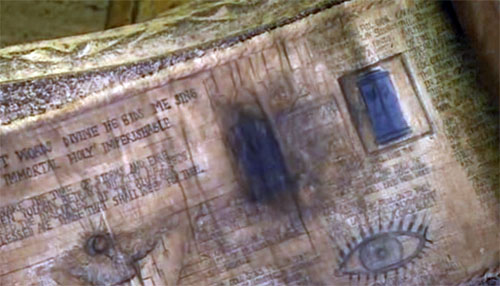
This episode is all about prophecy, as the Pyrovile have unlocked the seers’ abilities to tell the future. We see many examples of this, from the Sisterhood being able to communicate remotely to Evalina’s and Lucius’ piercing truths about the Doctor and Donna. When Lucius makes his proclamation that the Doctor is from Gallifrey, he continues with, “Doctor, she is returning. And you, daughter of London, there is something on your back.” It’s very clear that the “she” refers to none other than Rose Tyler, seen skulking about at the end of the previous episode but whose return is still unknown to the Doctor. I don’t know what might be on Donna’s back, though, unless it’s a target from a vengeful Rose who doesn’t like seeing that the Doctor has picked up another companion or three in her absence. This prophecy has the potential to be a cornerstone for the season as we see what it really means and how everything plays out.
Donna as Companion
This is the second episode with Donna Noble as the Doctor’s regular companion (not counting her original appearance in “The Runaway Bride” Christmas special). I have to admit that I pretty much despised Donna after the Christmas episode and wasn’t too happy to hear that she was replacing Martha Jones as the new companion. Donna really surprised me in the season opener, though. I still don’t like her, per se, but she doesn’t grate on me as badly as she did in “Bride.”
At the beginning of “Pompeii,” she’s back to being Screamy McScreamerson for a bit, but by the end she considers the situation she and the Doctor are in and comes around to seeing his point of view and agreeing. I think this all goes back to Donna being a very self centered individual, which is the main reason she was a horrible character in “Bride.” She has a very hard time seeing beyond her own immediate circumstance. Her first experience with the Doctor changed her worldview, and it made her realize that there is more out there than just herself. Although her egocentrism has been checked, she still has a hard time altering her viewpoint from her first impulsions.
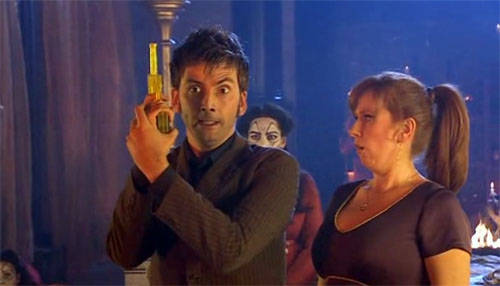
In “Pompeii” she immediately wants to save the people of the city and to warn them of their impending doom. The Doctor tells her she can’t do that, and he explains to her that they can not change the course of history by messing with the Vesuvius eruption. His protests fall on deaf ears, though, because she’s so convinced that her way is the only moral and just way, and she doesn’t even consider the other viewpoint until she’s locked in a meteoric escape pod with the Doctor near the end of the episode.
Her agreeing that making Vesuvius erupt is the only thing they can and should do is tempered by her insistence that they must save Caecilius and his family before leaving the era. The Doctor is hesitant but eventually agrees. It seems that both the Doctor and Donna are changing their ways, bit by bit. Donna may come around in time, but she’ll never be Rose Tyler or even Martha Jones. Or even, sadly, poor Astrid Peth.
The Lot of the Time Lord
Part of Donna’s quandary in “Pompeii” is that she is incapable of understanding why the Doctor can’t simply help the people and save them from the volcano, just as he saved her and so many others. Obvious timeline-rippling consequences aside, it’s a valid question, and the Doctor’s answer gives us a good explanation, as well as some more insight into what it means to be the last Time Lord.
Doctor: “Some things are fixed, some things are in flux. Pompeii is fixed.”
Donna: “How do you know which is which?”
Doctor: “Because that’s how I see the universe. Every waking second I see what is, what was, what could be, what must not. It’s the burden of the Time Lord, Donna. And I’m the only one left.”
The Caecilius Family
If you took high school Latin, chances are the Caecilius family seemed familiar to you. Caecilius, his wife Metella, and their son Quintus are the family featured throughout the Cambridge Latin Course that is the standard for the majority of high school Latin classes. The family is based on a real family that did live in Pompeii, although the facts differ between the truth, the Latin textbook stories, and the Doctor Who version. In “The Fires of Pompeii,” Caecilius and his family escape the eruption with the Doctor and move to Rome, where they worship the Doctor and Donna as their household gods. The textbook version has Caecilius and Matella perishing in the fires while Quintus escapes to live out a life of politics. And the truth seems to have Caecilius dying in the earthquake and not even living to see Vesuvius seventeen years later.
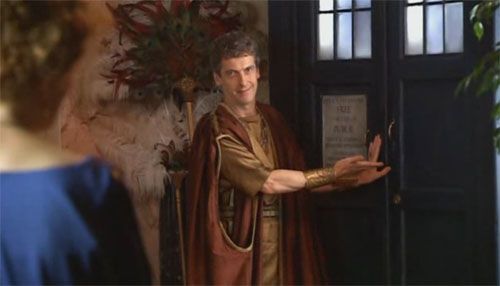
The family’s inclusion in the episode is a fun and grounding addition. They are firmly anchored in the beliefs and times of ancient Roman culture, but their interactions are unquestionably identifiable in a contemporary setting. We’ve seen this a number of times previously on Doctor Who, and it’s easily explained by having the TARDIS translate the local language to English for the Doctor and his companion, and vice versa. The results are a little anachronistic, but it all fits into the context for a fun and relatable story.
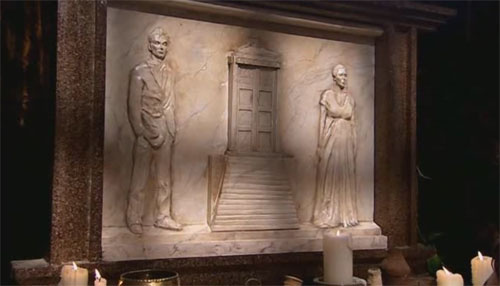
Donna: “Won’t our clothes look a bit odd?”
Doctor: “Nah, ancient Rome, anything goes. It’s a bit like Soho, only bigger.”



